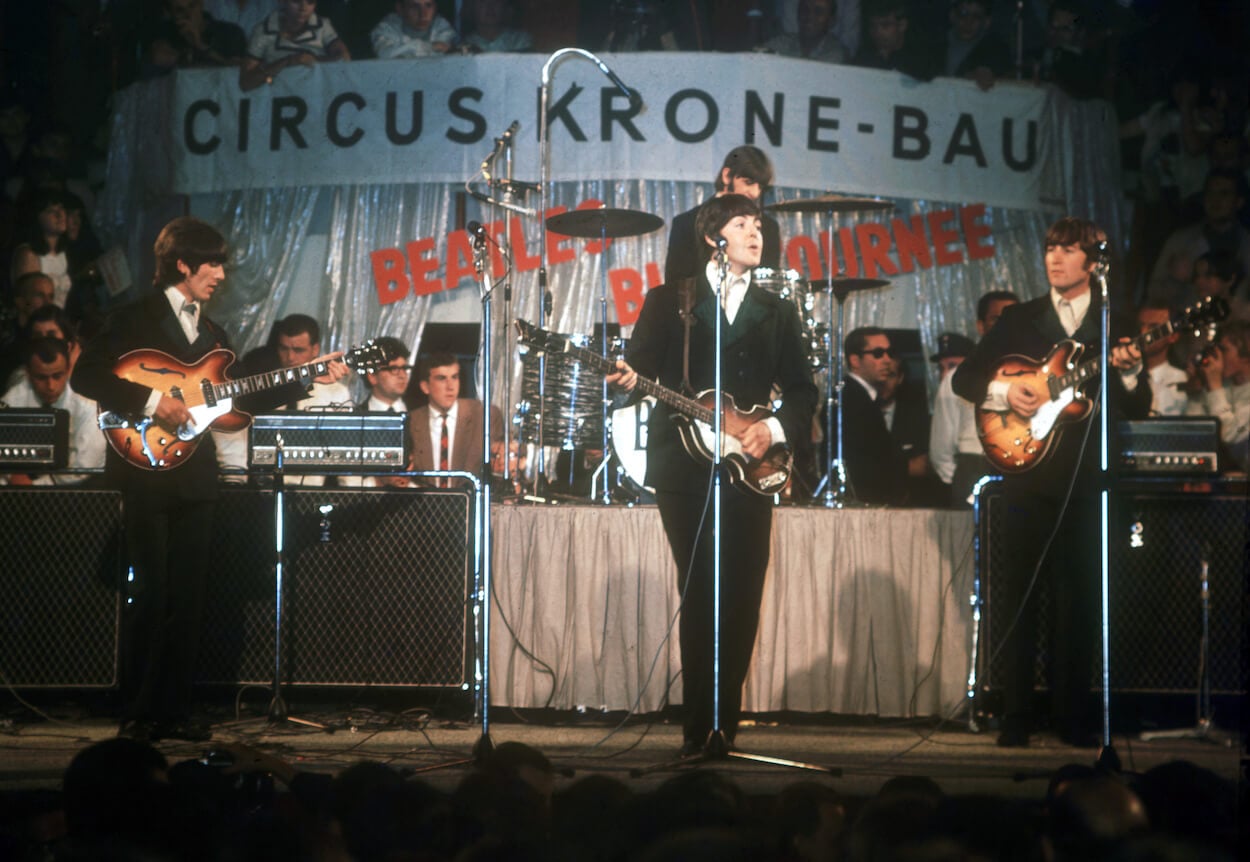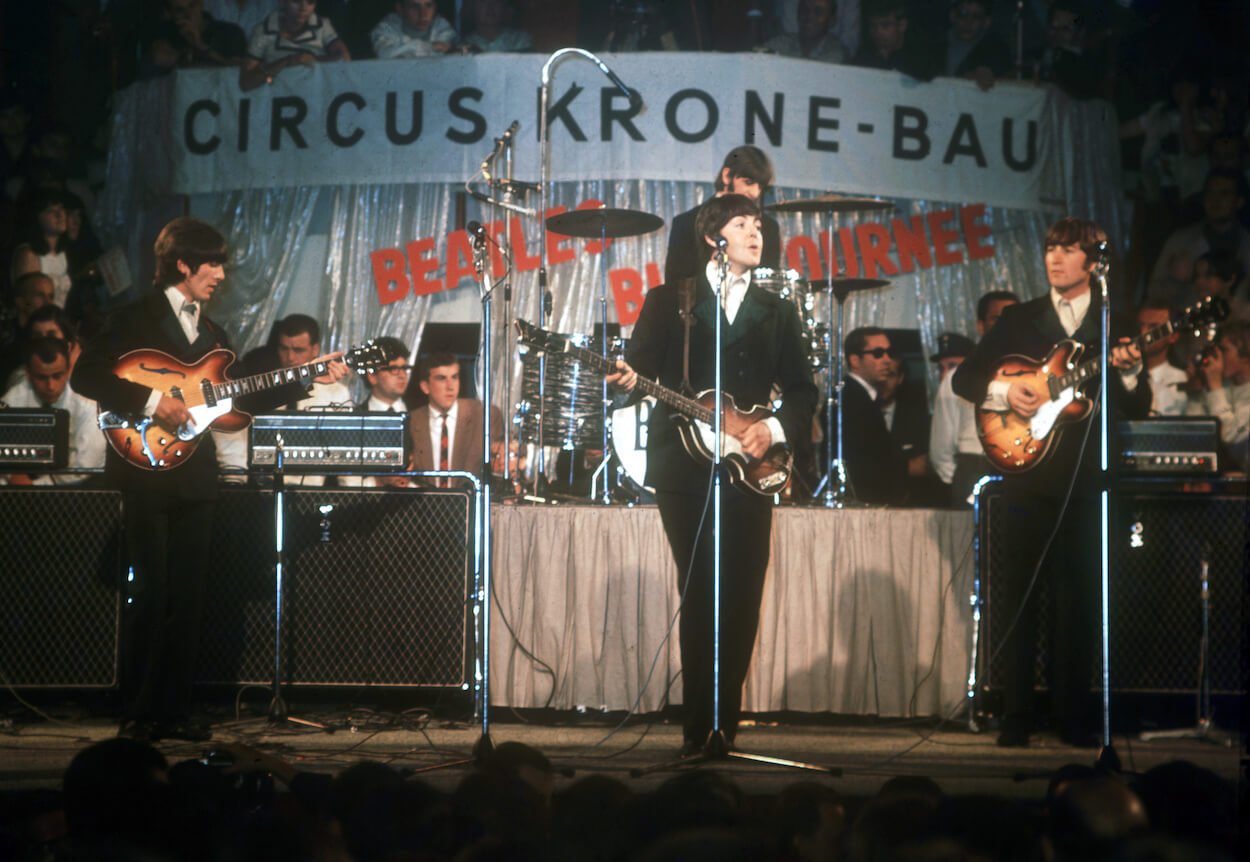
6 Beatles Songs With Lyrics in Other Languages
Not many people would disagree if you said The Beatles changed everything about pop music. The musicians who hated the band might disagree on principle, but their legions of fans would defend them. The Beatles sang several songs with lyrics in other languages to their fans around the globe.

1. ‘Komm, Gib Mir Deine Hand’
The Beatles cut their teeth playing multiple residencies in Hamburg, Germany, during the early 1960s. In his book Paul McCartney: A Life, author Peter Ames Carlin writes that Paul was the only band member who knew more than middling German when they first arrived. They all learned a lot more than the basics while they mach schau in Deutschland as they cut their hit song “I Want to Hold Your Hand” entirely in German (though they recorded it in early 1964, just before they broke through in the United States).
2. ‘Sie Liebt Dich’
The Beatles pleased their German fans by performing another song in their native tongue. The Fab Four recorded “Sie Liebt Dich” — better known as “She Loves You” — in early 1964 during the same session that produced “Komm, Gib Mir Deine Hand.” The Beatles didn’t sing in other languages often, but making their first two non-English songs for the Germans made sense. George Harrison said he and his bandmates didn’t have a clue about being professional musicians until arriving in Hamburg. They emerged from their German stints ready to take on the world, and we know how well that worked out.
3. ‘Michelle’
The first time The Beatles sang lyrics in other languages on a record came when they cut their two German tunes in 1964. Paul McCartney’s “Michelle” predates both of them. According to The Beatles Lyrics editor Hunter Davies, “Michelle” was one of Paul’s first songs. He sang it at parties in Liverpool, hoping to impress girls with his faux-French. A friend’s wife — a French teacher — helped him with some of the lyrics for the Rubber Soul song, which The Beatles recorded in 1965.
4. ‘Besame Mucho’
The Beatles’ first song with words in other languages was one of their first recordings. They adapted a version of the 1940s Mexican love song “Bésame Mucho” for their live set in 1961 and recorded it for their EMI Records audition on June 6, 1962 (per Davies). Pete Best played the drums as Paul sang. The song’s title words are the only lyrics in Mexican, but it pointed to the multi-lingual efforts in The Beatles’ future.
5. ‘Across the Universe’
The Let It Be track was a bit of an outlier for The Beatles. The band tended to work on songs quickly, but they waited years to release “Across the Universe.” John Lennon wrote the song while still married to Cynthia Lennon. The Fab Four recorded it in early 1968. The world didn’t hear it until late 1969 (on a compilation release with multiple artists), and it didn’t appear on a Beatles album until 1970’s Let It Be.
John sings “Jai guru deva om” throughout the song. Where many Beatles songs with lyrics in other languages tended to be in European languages, “Jai guru deva om” is a Sanskrit phrase that roughly translates to “I give thanks to Guru Dev.”
6. ‘Sun King’
The languid and daydreamy Abbey Road track “Sun King” contains bare-bones lyrics — until it nears its end. Paul, George, and John harmonize as they sing, “Cuando para mucho mi amore de felice corazón / Mundo paparazzi mi amore chicka ferdy parasol / Cuesto obrigado tanta mucho que canite carousel.”
The vaguely Spanish/Italian/Portuguese words are nonsensical gibberish. The “chicka ferdy” portion is a form of naughty Liverpool slang, which Paul said hid profanity. The random and sudden shift from English to Latin languages might have led listeners to overlook the hidden profanity.
The Fab Four sang their biggest hits in crystal clear English, but several Beatles songs had lyrics in other languages. The words didn’t always make sense or mean much of anything, but those vaguely exotic lyrics added some foreign intrigue to the world-conquering band.
For more on the entertainment world and exclusive interviews, subscribe to Showbiz Cheat Sheet’s YouTube channel.


